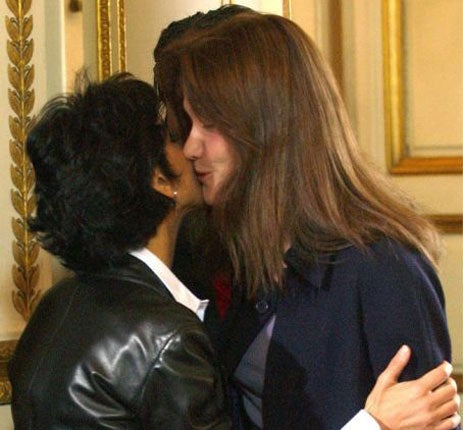Sealed with a kiss, the demise of Dati

Your support helps us to tell the story
From reproductive rights to climate change to Big Tech, The Independent is on the ground when the story is developing. Whether it's investigating the financials of Elon Musk's pro-Trump PAC or producing our latest documentary, 'The A Word', which shines a light on the American women fighting for reproductive rights, we know how important it is to parse out the facts from the messaging.
At such a critical moment in US history, we need reporters on the ground. Your donation allows us to keep sending journalists to speak to both sides of the story.
The Independent is trusted by Americans across the entire political spectrum. And unlike many other quality news outlets, we choose not to lock Americans out of our reporting and analysis with paywalls. We believe quality journalism should be available to everyone, paid for by those who can afford it.
Your support makes all the difference.The French Justice Minister Rachida Dati, who returned to work five days after giving birth this month, has been banished by President Nicolas Sarkozy into the "internal exile" of the European Parliament.
Mme Dati, 43, will retain her job until May but has agreed to stand down to become deputy leader of the ruling party's campaign in the greater Paris area for the European elections in June.
Although officially presented as a new, democratic and European adventure for Mme Dati, the decision amounts to a serious demotion for a woman catapulted into high office 20 months ago as a symbol of President Sarkozy's drive to "open up" French public life to women and minorities.
Mme Dati, a daughter of poor Algerian and Moroccan immigrants, is said to have begged the President to remain in her senior ministerial job, or at least national politics. According to one version of events, she won only a vague promise that she would be brought back into government, in another post, some time in the future.
Although initially a confidante of M. Sarkozy and a close friend of his ex-wife, Cécilia, Mme Dati's standing in the presidential "court" has plummeted in the past 15 months. The abrupt departure of the second Mme Sarkozy in October 2007 weakened her link to the President. Her campaign to rationalise the French courts was resisted by judges and lawyers who accused her of being high-handed and insensitive.
Her glamorous lifestyle and emergence as a "celeb" in glossy magazines, irritated M. Sarkozy. Worse, Mme Dati has an awkward relationship with the President's influential third wife. Carla Bruni-Sarkozy once revealed she had teased Mme Dati by pointing to the presidential bed at the Elysée Palace and saying: "You would have liked to have climbed in there, wouldn't you?"
Mme Dati announced last September that she was pregnant, but refused to name the father, angering the conservative-traditional wing of the ruling centre-right party, the Union pour un Mouvement Populaire (UMP). Mme Dati's much-criticised decision this month to return to work five days after giving birth to her daughter, Zohra, was widely seen as a desperate attempt to hang on to her job.
If so, it failed. President Sarkozy had initially tried to persuade her in December that she should take the number one position in the UMP's list for the European elections in greater Paris this June. She refused, saying she wanted to remain in national politics.
Yesterday it was announced that she had agreed to take a lesser position – the second spot, behind the Agricultural Minister, Michel Barnier. Under rules laid down by President Sarkozy, both ministers will have to resign before the campaign begins in May and both will have to take up their seats in Strasbourg and Brussels if elected (which is virtually certain).
Unlike M. Barnier, a former European commissioner, Mme Dati has never shown any previous interest in European politics. Membership of the European Parliament is as much a marginal position in French politics as it is in Britain. The decision was interpreted by the French media as a slow-motion dumping of Mme Dati. "It is an elegant way of getting her out of the Justice Ministry, without cutting her off from all prospects of a future in government," a senior UMP figure told the newspaper, Le Monde.
Other officials suggested she was unlikely to return to the cabinet but might, if she took to European "exile", be considered for the French position within the European Commission in 2010. It remains to be seen, therefore, whether this is the end of the meteoric rise of Mme Dati – or a new beginning.
Mme Dati was born near Lyons. Through academic brilliance, work and cheek, she became a highly-paid lawyer. Seven years ago she bombarded the newly-appointed Interior Minister with letters requesting a job. The minister, Nicolas Sarkozy, eventually relented. Mme Dati became a close adviser and one of two spokespeople for his presidential campaign in 2007.
Her appointment as Justice Minister in May 2007 stunned many people. President Sarkozy made her the poster-child of a long-overdue "overture" of French politics to racial minorities. Mme Dati's travails, which began almost immediately, have been interpreted in different ways. Some politicians suggest she has been given a tougher time than necessary because she is a woman of North African origin. Others say that the President wilfully appointed someone not equipped politically for such a high-profile job.
Join our commenting forum
Join thought-provoking conversations, follow other Independent readers and see their replies
Comments